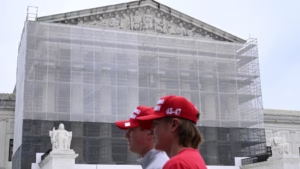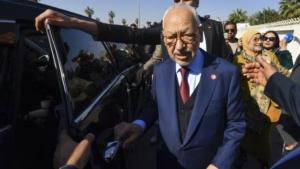Occasionally, journalists confuse me, and I am one – though my critical detractors might argue otherwise.
Perhaps as you have also observed, with a combination of surprise and amusement, the ongoing sensationalism dominating North America’s and beyond’s 24-hour “news cycle.”
With the fleeting attention span typical of many journalists, today’s outrage is frequently short-lived, as another outrage is likely to emerge tomorrow.
However, the current outrage engulfing Washington, D.C. seems to be different and may keep the press corps preoccupied for more than a couple of days.
When this occurs, outrage often escalates into a major scandal. Journalists crave these situations because such exposure can lead to significant recognition and acclaim for the reporter who uncovered the original issue.
The essential elements of a scandal are already in place: numerous outraged politicians – mostly Democrats this time – and a circle of “national security experts” quickly appearing on TV demonstrating their outrage and demanding investigations and resignations of those responsible for the incident.
It won’t be long before this new scandal is dubbed “Appgate,” a nod to the infamous Watergate, securing its status as a major scandal.
Why Appgate?
Apparently, elements of America’s national security establishment, including Vice President JD Vance, created an 18-person group chat on the Signal messaging app to discuss the possibility of bombarding Yemen before actually doing so.
Commentators are furious because such sensitive conversations should occur in the secure Situation Room near the Oval Office, rather than on an online forum with encryption as easily breached as a Rubik’s cube by a skilled individual.
Furthermore, cable news personalities are in a frenzy due to Jeffrey Goldberg, editor-in-chief of The Atlantic, being mistakenly invited to join the chat and having access to “war planning” in President Donald Trump’s administration, which values mismanagement over discretion.
This inadvertent openness should be greeted with enthusiasm by the press rather than condemnation, offering a rare glimpse into the actual decision-making behind state affairs.
I acknowledge the incompetence of Vance and his team, which puts the incompetent Maxwell Smart to shame. Nonetheless, the media should celebrate this accidental transparency.
Goldberg’s accidental inclusion has naturally brought him outrage. Yet, it has also revitalized his career. While he is weeping over the security breach, it has been a boon for his career, propelling him into the media spotlight.
The real question is why Goldberg didn’t quietly gather more information before revealing his role. His hastiness might have cost him further insights.
While Goldberg may be an “outraged” patriot, it’s strange that Trump, who doesn’t reportedly start work until nearly noon, wasn’t involved in the discussions about attacking the Houthis, suggesting he may not understand how the Signal app works.
Additionally, Goldberg seems to believe that Vance and others view Europeans as “pathetic” “freeloaders” who rely repeatedly on the US for assistance.
The incident has left a stain on the transatlantic “alliance” and could potentially harm Vance’s future political prospects if he disagreed with Trump’s decision to strike the Houthis.
Ultimately, we owe thanks to Trump and his 18 chatroom participants for their blatant and enlightening incompetence.
Continue the good work, please.
The views expressed in this article are the author’s own and do not necessarily reflect Al Jazeera’s editorial stance.
Perhaps as you have also observed, with a combination of surprise and amusement, the ongoing sensationalism dominating North America’s and beyond’s 24-hour “news cycle.”
With the fleeting attention span typical of many journalists, today’s outrage is frequently short-lived, as another outrage is likely to emerge tomorrow.
However, the current outrage engulfing Washington, D.C. seems to be different and may keep the press corps preoccupied for more than a couple of days.
When this occurs, outrage often escalates into a major scandal. Journalists crave these situations because such exposure can lead to significant recognition and acclaim for the reporter who uncovered the original issue.
The essential elements of a scandal are already in place: numerous outraged politicians – mostly Democrats this time – and a circle of “national security experts” quickly appearing on TV demonstrating their outrage and demanding investigations and resignations of those responsible for the incident.
It won’t be long before this new scandal is dubbed “Appgate,” a nod to the infamous Watergate, securing its status as a major scandal.
Why Appgate?
Apparently, elements of America’s national security establishment, including Vice President JD Vance, created an 18-person group chat on the Signal messaging app to discuss the possibility of bombarding Yemen before actually doing so.
Commentators are furious because such sensitive conversations should occur in the secure Situation Room near the Oval Office, rather than on an online forum with encryption as easily breached as a Rubik’s cube by a skilled individual.
Furthermore, cable news personalities are in a frenzy due to Jeffrey Goldberg, editor-in-chief of The Atlantic, being mistakenly invited to join the chat and having access to “war planning” in President Donald Trump’s administration, which values mismanagement over discretion.
This inadvertent openness should be greeted with enthusiasm by the press rather than condemnation, offering a rare glimpse into the actual decision-making behind state affairs.
I acknowledge the incompetence of Vance and his team, which puts the incompetent Maxwell Smart to shame. Nonetheless, the media should celebrate this accidental transparency.
Goldberg’s accidental inclusion has naturally brought him outrage. Yet, it has also revitalized his career. While he is weeping over the security breach, it has been a boon for his career, propelling him into the media spotlight.
The real question is why Goldberg didn’t quietly gather more information before revealing his role. His hastiness might have cost him further insights.
While Goldberg may be an “outraged” patriot, it’s strange that Trump, who doesn’t reportedly start work until nearly noon, wasn’t involved in the discussions about attacking the Houthis, suggesting he may not understand how the Signal app works.
Additionally, Goldberg seems to believe that Vance and others view Europeans as “pathetic” “freeloaders” who rely repeatedly on the US for assistance.
The incident has left a stain on the transatlantic “alliance” and could potentially harm Vance’s future political prospects if he disagreed with Trump’s decision to strike the Houthis.
Ultimately, we owe thanks to Trump and his 18 chatroom participants for their blatant and enlightening incompetence.
Continue the good work, please.
The views expressed in this article are the author’s own and do not necessarily reflect Al Jazeera’s editorial stance.









